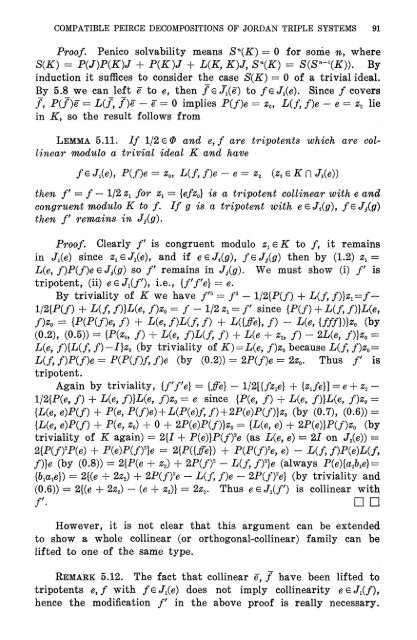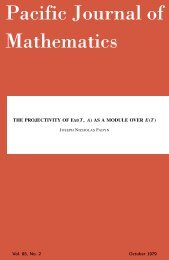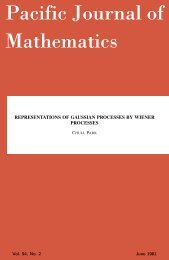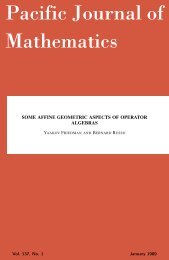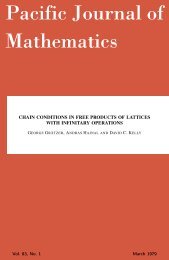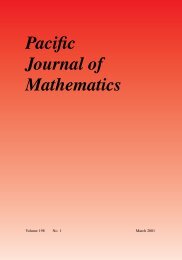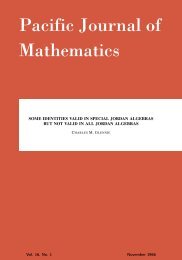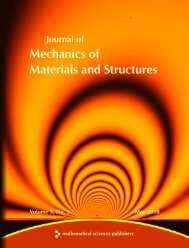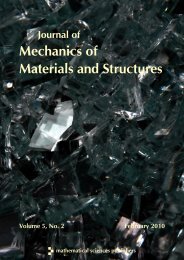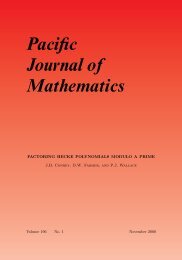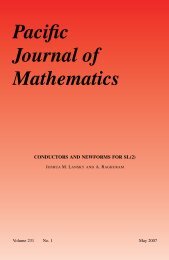Compatible Peirce decompositions of Jordan triple systems - MSP
Compatible Peirce decompositions of Jordan triple systems - MSP
Compatible Peirce decompositions of Jordan triple systems - MSP
Create successful ePaper yourself
Turn your PDF publications into a flip-book with our unique Google optimized e-Paper software.
COMPATIBLE PEIRCE DECOMPOSITIONS OF JORDAN TRIPLE SYSTEMS 91<br />
Pro<strong>of</strong>. Penico solvability means S n (K) = 0 for some n, where<br />
S(K) = P(J)P(K)J + P(K)J•+ L(K, K)J, S\K) = S{S n ^(K)). By<br />
induction it suffices to consider the case S(K) = 0 <strong>of</strong> a trivial ideal.<br />
By 5.8 we can left e to e, then fe Ji(e) to feJ^e). Since / covers<br />
/, P(/)e" = L(f, f)e-e = 0 implies P(/)β - z 0 , L(f,f)e ~ e = z 2 lie<br />
in if, SO the result follows from<br />
LEMMA 5.11. If 1/2 eΦ and e, f are tripotents which are collinear<br />
modulo a trivial ideal K and have<br />
fe J&), P{f)e = z 0, L(/, f)e-e = z 2 (z.eK<br />
then /' = / — 1/2 2 X /or ^ = {efz 0} is a tripotent collinear with e and<br />
congruent modulo K to f. If g is a tripotent with eeJ^g), fsJj(g)<br />
then f remains in J 3-(g).<br />
Pro<strong>of</strong>. Clearly /' is congruent modulo zxeK to /, it remains<br />
in Jx{e) since z1eJ1{e), and if eeJt(g) f feJά(g) then by (1.2) zx =<br />
L(e, f)P(f)eeJj(g) so /' remains in J9 (g). We must show (i) /' is<br />
tripotent, (ii) eeJ^f), i.e., {f'f'e} = e.<br />
By triviality <strong>of</strong> K we have /' 3<br />
= f - 1/2{P(/) + L(/,/)K=/-<br />
1/2{P(/) + L(f, f)}L(e, f)z0 = / - 1/2 st = /' since {P(/) + L(ff f)}L(e,<br />
f)z0 - {P(P(/>, /) + L{e,f)L{f,f) + L({ffe}> f) - Ufi, {///})}«o (by<br />
(0.2), (0.5)) = {P(z0, f) + L(e, f)L(f, f) + L(e + z2, /) - 2L(e, /)}« 0 =<br />
L(e, f){L(f, f)-I}z0 (by triviality <strong>of</strong> K)=L{e, f)z0 because L(/, /)« 0=<br />
Uf,f)P(f)e = P(P(f)f,f)e (by (0.2)) = 2P(/)β = 2β 0. Thus /' is<br />
tripotent.<br />
Again by triviality, {f'f'e} = {#β} - 1/2[{A*} + {^/β}] = e + s 2 -<br />
l/2{P(e, /) + Uβ, f)}L(e, f)z 0 - e since {P(β, /) + L(e, f)}L(e, f)z 0 -<br />
{Ufi, e)P(f) + P(e, P(f)e) + L(P(e)f,f) + 2P(e)P(f)}z 0 (by (0.7), (0.6)) =<br />
{L(e, e)P(f) + P(β, βo) + 0 + 2P(e)P(/)}^ 0 = {L(e, β) + 2P( β )}P(/)^ 0 (by<br />
triviality <strong>of</strong> iί again) - 2{I + P(e)}P(/) 2 e (as L(e, e) = 21 on J 2 (e)) =<br />
2{P(/) 2 P(β) + P(β)P(/) 2 }β = 2{P({ffe}) + P(P(fYe, e) - L(f, /)P(β)L(/,<br />
/)}β (by (0.8)) = 2{P(β + z 2 ) + 2P(/) 2 - L{f,ff)e (always P(e){aAe} =<br />
{b&e}) = 2{(e + 2z 2 ) + 2P(/) 2 β - L(/, f)e - 2P{f) 2 e] (by triviality and<br />
(0.6)) = 2{(e + 2z 2 ) - (β + 2J 2 )} = 2^. Thus eeJ^f) is collinear with<br />
/'. D D<br />
However, it is not clear that this argument can be extended<br />
to show a whole collinear (or orthogonal-collinear) family can be<br />
lifted to one <strong>of</strong> the same type.<br />
REMARK 5.12. The fact that collinear e, f have been lifted to<br />
tripotents β, / with feJ^e) does not imply collinearity eeJ^f),<br />
hence the modification /' in the above pro<strong>of</strong> is really necessary.


